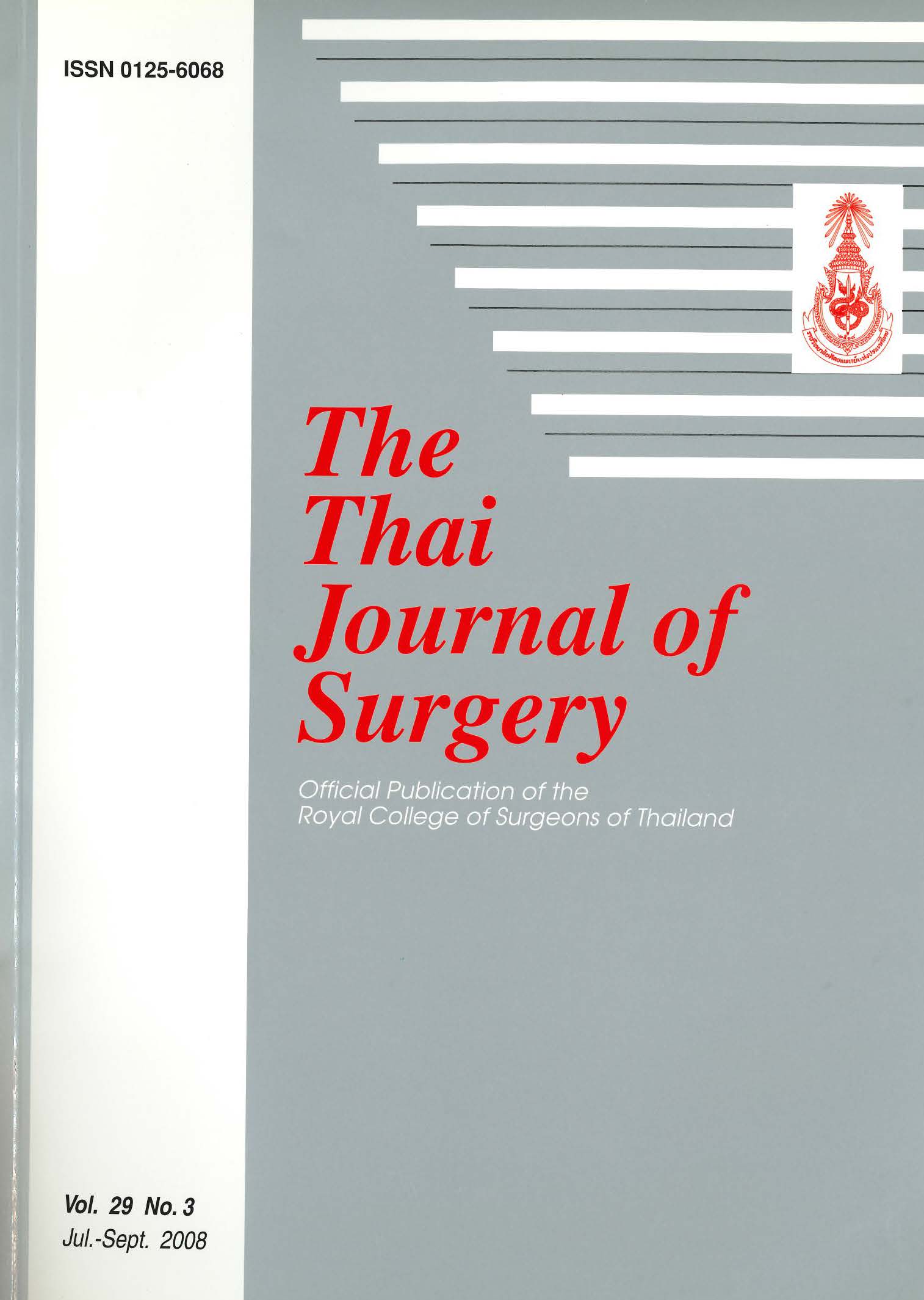Mono- or Poly- Antimicrobial Prophylaxis in Colorectal Surgery
Abstract
Objective: The use of prophylactic antibiotics in colorectal surgery is well established. Type of antibiotics, however; varies significantly among surgeons. The aim of this study was to determine whether mono-antimicrobial regimen is as effective as poly-antimicrobial regimen in the prevention of surgical wound infections following elective colorectal cancer surgery.
Materials and Methods: The medical records of 56 patients with colorectal cancer undergoing elective oncological resection from January 2004 to September 2006 at Siriraj Hospital, Bangkok, were retrospectively reviewed. Patients were divided into two groups according to the regimen of prophylactic intravenous antibiotics; group A: monotherapy (cefminox-Meicelin) and group B: polytherapy (ceftriaxone plus metronidazole). The duration of antibiotics administration was up to 24 hours in colonic surgery and up to 3 days in rectal surgery. Patient characteristics and rate of wound infection within 30 days after the operation were compared between the two groups.
Results: This study included 25 males and 31 females, with a mean age of 63 years (range 27-:86). There were 18 patients in group A and 38 patients in group B. There was no significant difference in patient characteristics between the two groups. Overall rate of wound infection was 14.35%. Rate of wound infection was not significantly different between the two groups (group A 11.1 % vs group B 15.8%, P = 1.00). No adverse drug reaction was found in this study.
Conclusions: Based on this study, there was no significant difference in the rate of wound infection
following elective colorectal cancer surgery with mono-antimicrobial regimen, compared to that with poly antimicrobial regimen. Thus, single drug regimen could be a feasible alternative in antibiotic prophylaxis for the prevention of wound infection following elective lower gastrointestinal tract surgery.
References
2. Colleran G, Heneghan H, Sweeney KJ, et al. A comparison of surgical impression, histological findings and microbiological results at open appendicectomy, Ir Med J 2007;100:593-6.
3. Kasatpibal N. Norgaard M. Sorensen HT, et al. Risk of surgical site infection and efficacy of antibiotic prophylaxis: a cohort study of appendectomy patients in Thailand BMC infectious diseases 2006;6:111.
4. Mittelkotter U. Antimicrobial prophylaxis for abdominal surgery: is there a need for metronidazole? J Chemother 2001; 13:27-34
5. ZanellaE, RulllF, A multicenter randomized trial of prophylaxis with intravenous cefepime+ metronidazole or ceftriaxone + metronidazole in colorectal surgery. The 230 Study Group. J Chemother 2000; 12:63-71.
6. Watanabe S, Omoto S. Pharmacology of cefminox, a new bactericidal cephamycin. Drugs Exp Cin Res 1990; 16:461-7.
7. Horan TC, Gaynes RP, Martone WJ, et al, CDC definitions of nosocomial surgical site infections, 1992: a modification of CDC definitions of surgical wound infections. Infect Control Hosp Epidemiol 1992; 13:606-8.
8. Rovera F, Diurni M, Dionigi G, et al. Antibiotic prophylaxis in colorectal surgery. Expert Rev Anti infect Ther 2005; 3:787-95.
9. Goldmann DA, Weinstein RA, Wenzel RP, et al, Strategies to Prevent and Control the Emergence and Spread of Antimicrobial-Resistant Microorganisms in Hospitals. A challenge to hospital leadership. JAMA 1996; 275:234-40.
10. Scottish Intercolligates Guidelines Network. Antibiotic prophylaxis in surgery. SIGN Publication 2001;45.
11. Menzel J, Bauer J, von Pritzbuer E, et al. Perioperative use of ampicillin/sulbactam, cefoxitin and piperacillin/ metronidazole in elective colon and rectal surgery. A prospective randomized quality assurance study of 422 patients. Chirurg 1993; 64:649-52.
12. Jewesson P, Chow A, Wai A, et al. A double-blind, randomized study of three antimicrobial regimens in the prevention of infections after elective colorectal surgery. Diagn Microbiol Infect Dis 1997:29:155-65.
13. McDonald PJ, Karran SJ, A comparison of intravenous cefoxitin and a combination of gentamicin and metronidazole as prophylaxis in colorectal surgery. Dis Colon Rectum 1983; 26:661-4.
14. Song F, Glenny AM. Antimicrobial prophylaxis in colorectal surgery: a systematic review of randomized controlled trials. Br J Surg 1998; 85:1232-41.
15. KwokSP, Lau WY, Leung KL, et al. Amoxycillin and clavulanic acid versus cefotaxime and metronidazole as antibiotic prophylaxis in elective colorectal resectional surgery. Chemotherapy 1993:39:135-9.
16. AhChong K, Yip AW, Lee FC, et al. Comparison of prophylactic ampicillin/sulbactam with gentamicin and metronidazole in elective colorectal surgery: a randomized clinical study. J Hosp Infect 1994; 27:149-54.
Downloads
Published
How to Cite
Issue
Section
License
Articles must be contributed solely to The Thai Journal of Surgery and when published become the property of the Royal College of Surgeons of Thailand. The Royal College of Surgeons of Thailand reserves copyright on all published materials and such materials may not be reproduced in any form without the written permission.



